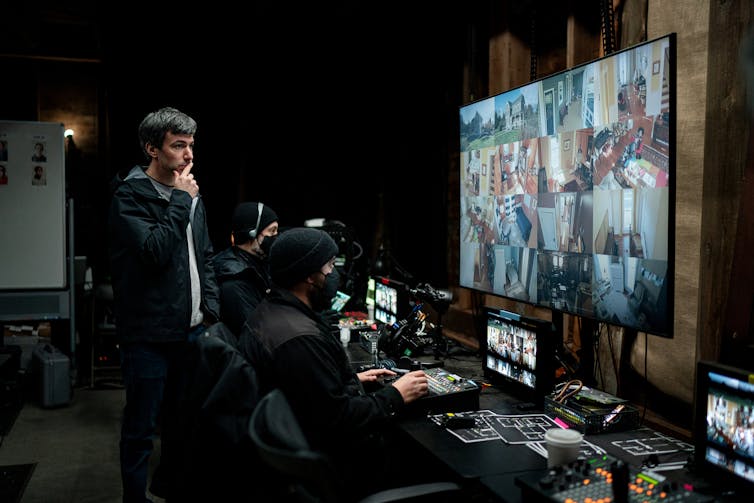Source: The Conversation (Au and NZ) – By Tamara May, Psychologist and Research Associate in the Department of Paediatrics, Monash University

HBO
While we all like to be prepared for what might happen in the future, like those difficult conversations and life choices, some go to extraordinary lengths to try and ensure a happy outcome.
Comedian Nathan Fielder explores this in his new reality TV series, The Rehearsal, where he goes to great lengths to help people rehearse future events.
The people Fielder works with are confessing to a lie they have been keeping for years, or exploring whether to make a life choice like having a child.
Using complex flow charts and scripting conversations and actions, Fielder goes to extremes to recreate future situations and plan for all possible outcomes.
In the first episode, Fielder builds a replica bar and hires actors to play the role of patrons and staff to mirror the environment where Brooklyn teacher Kor will tell his friend he has been lying to her about having a masters degree.
Fielder documents scripts for conversations in advance, including for making telephone calls to alert actors to a change in circumstances to their agreements.
The future situations are practised, repeatedly, until the person feels comfortable and ready to do the real thing.
Interestingly, for many people with autism, The Rehearsal won’t be that different to everyday life, where rehearsing and practising future scenarios is a way to cope with the anxiety of unpredictable social interactions and life events.
Read more:
Most adults with autism can recognise facial emotions, almost as well as those without the condition
Everyone rehearses
We all, to some extent, rehearse future events or interactions in our lives.
We might talk it through with our friends and family to work out what to say and how, or imagine in our minds the way future situations will play out.
Rehearsing future situations and conversations is also a common activity in therapy. It might include role-playing being assertive in a relationship, asserting needs in a friendship or asking for a pay increase at work.

HBO
Elite athletes mentally rehearse a future performance in the sporting domain, like how they will launch out of the blocks and run the 100 metres to ensure an optimum performance.
Some rehearsals, such as medical simulation, are rather similar to Fielder’s recreated world, and ensure medical professionals can practise and rehearse complex medical procedures.
You can even rehearse your dreams to change recurring nightmares to have a happier ending.
Social stories
Most of us don’t go to the level of detail of Fielder in The Rehearsal. That is, unless you have autism or perhaps have a child with autism.
One of the core symptoms of autism is being resistant to change and becoming distressed and upset when things don’t go to plan.
Another core symptom is not knowing how to act and what to say in social situations.
These characteristics can result in experiencing negative social interactions or being upset by unexpected events, resulting in anxiety about future similar situations.
To try and prevent this anxiety and possible poor outcomes, people with autism can engage in meticulous planning for future situations.
For children with autism, social stories have been a mainstay intervention, where a future activity is put into story book form with pictures and scripts. This can help children to understand what will happen and what to do and say, so they can imagine and practise the situation and cope with any emotions that might arise.
The freedom to be yourself
Over time, to try and fit in with the world, people with autism can learn to mask, where they hide their real feelings and natural responses, and instead behave in ways considered “socially acceptable”.
They might practise masking in a social situation, similar to Fielder’s rehearsals.
We all mask to some extent, but for a person with autism masking can be an invalidating and exhausting experience where they can lose their sense of self with negative impacts on their mental health.

HBO
There is a growing neurodiversity movement that sees autism and other neurodevelopmental conditions as different, not disordered, and challenges the notion that neurodiverse people have to change to fit in with the world.
This means creating environments where people can feel safe to unmask and be themselves.
This space to unmask and be your full, authentic self is important. As Fielder shows in The Rehearsal, things don’t always go to plan. In the third episode, Patrick leaves the show midway through his rehearsal, finding the simulation resolved his feelings and he no longer needed to confront his brother.
Rehearsals can be helpful and prepare us. Fielder takes them to extremes, taking up time that perhaps could be better used living one’s life, rather than playing out scenarios that may never occur.
None of us can ever be fully prepared for what might happen. That’s what makes life interesting and scary at the same time.
Read more:
Autism is still underdiagnosed in girls and women. That can compound the challenges they face
![]()
Tamara May does not work for, consult, own shares in or receive funding from any company or organisation that would benefit from this article, and has disclosed no relevant affiliations beyond their academic appointment.
– ref. Nathan Fielder’s new comedy The Rehearsal will be familiar to anyone with autism – https://theconversation.com/nathan-fielders-new-comedy-the-rehearsal-will-be-familiar-to-anyone-with-autism-188071






